CATHOLIC WORKER
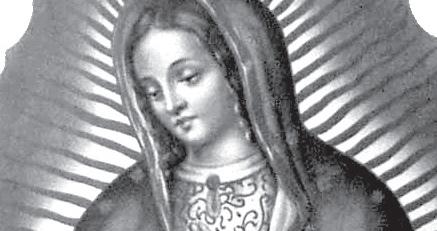


By Louise Zwick
I was reading a commentary on the Gospel according to St. Luke at the time when an event that surprised the world took place.
It was unexpected that a missionary to the poor of Latin America, a priest, then bishop, then cardinal, who had reached out to the marginalized, to refugees for years, could become Pope of the Catholic Church. Not only was he an American, but also a citizen of Peru. Yet in the wisdom of the Holy Spirit, Robert Prevost was elected and took the name of Pope Leo XIV.
The Cardinals at the Conclave apparently very much appreciated his other qualifications and experience as well--as international prior of his Augustinian religious order, as the Vatican Prefect of the Congregation for Bishops and President of the Pontifical Commission for Latin America. His doctorate in canon law appealed to many Cardinals.
For those of us in the Catholic Worker movement, it has been his life and work with the poor of Latin America that especially touched our hearts. His immediate call for peace when he was presented after the conclave and his emphasis on working toward a more just world economy echoed the concerns of Dorothy Day and all in the CW movement.
The book I was reading about the Gospel of Luke brought out the meaning of the
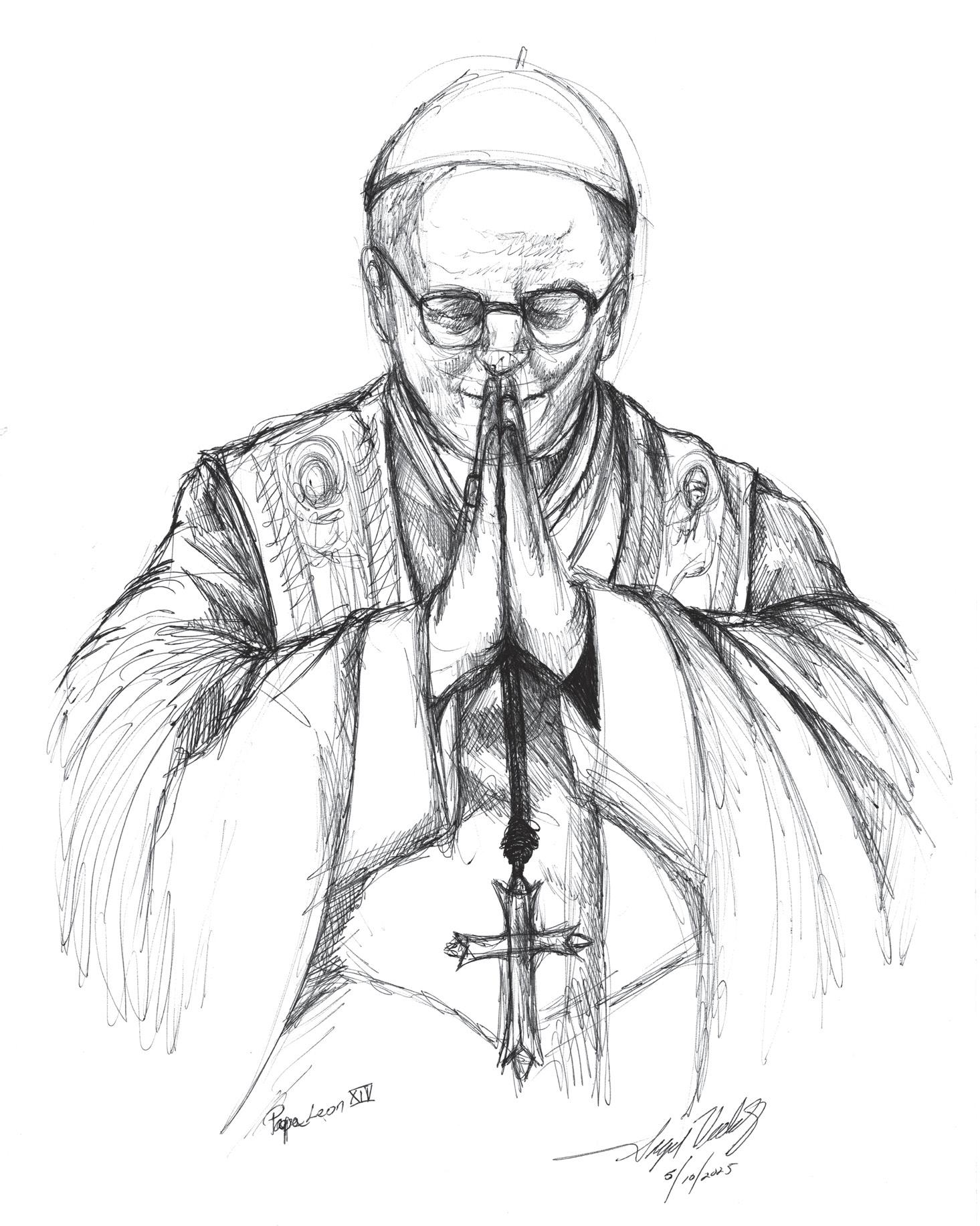
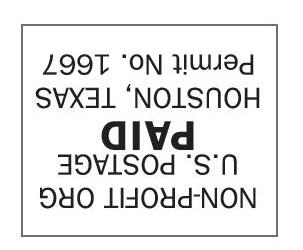
Beatitudes presented there (in some contrast to the Beatitudes in the Gospel of St. Matthew). Taking time to actually read the Gospels, especially the Beatitudes, can change our perspective and our hearts.
Here are the Beatitudes from Luke 6:20-26.
“Then he looked up at his disciples and said:
Blessed are you who are poor for yours is the kingdom of God
Blessed are you who are hungry now, for you will be filled.
Blessed are you who weep now for you will laugh.
Blessed are you when people hate you and when they exclude you, revile you, and defame you on account of the Son of Man. Rejoice on that day and leap for joy, for surely your reward is great in heaven, for that is how their ancestors treated the prophets.
But woe to you who are rich, for you have received your consolation.
Woe to you who are full now, for you will be hungry.
Woe to you who are laughing now, for you will mourn and weep.
Woe to you when all speak well of you, for that is how their ancestors treated the false prophets.”
continued page 8
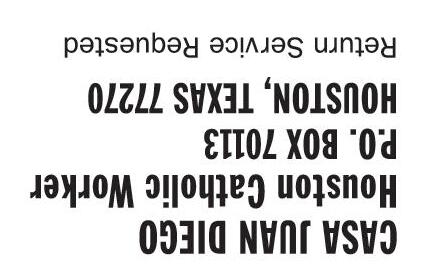
We want to be a Church that moves forward, a Church that always seeks peace, that always seeks charity, that always seeks to be close above all to those who are suffering. — Pope Leo.

In his homily on May 18, Pope Leo asked us to be missionary disciples:
“We see this in today’s Gospel, which takes us to the Sea of Galilee, where Jesus began the mission he received from the Father: to be a “fisher” of humanity in order to draw it up from the waters of evil and death. Walking along the shore, he had called Peter and the other first disciples to be, like him, “fishers of men”.
Now, after the resurrection, it is up to them to carry on this mission, to cast their nets again and again, to bring the hope of the Gospel into the “waters” of the world, to sail the seas of life so that all may experience God’s embrace.”
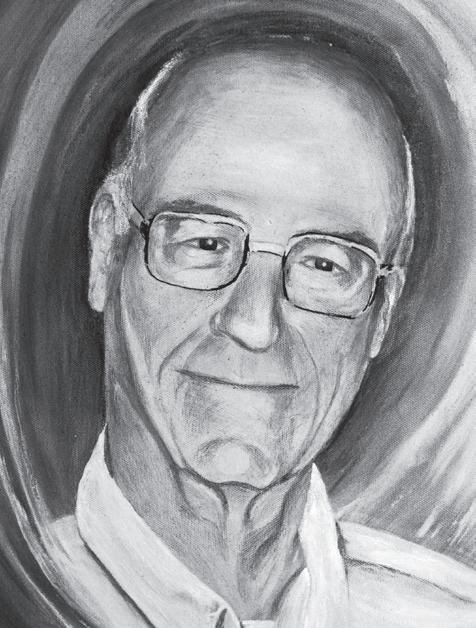
Casa Juan Diego was founded in 1980, following the Catholic Worker model of Dorothy Day and Peter Maurin, to serve immigrants and refugees and the poor. From one small house it has grown to ten houses. Casa Juan Diego publishes a newspaper, the Houston Catholic Worker, four times a year to share the values of the Catholic Worker movement and the stories of the immigrants and refugees uprooted by the realities of the global economy.
• Food Donation Central Office: 4818 Rose, Houston, TX 77007
• Women’s House of Hospitality: Hospitality and services for immigrant women and children
• Assistance to paralyzed or seriously ill immigrants living in the community.
Casa Don Marcos Men’s House: For refugee men new to the country.
Casa Don Bosco: For sick and wounded men.
• Casa Maria Social Service Center and Medical Clinic: 6101 Edgemoor, Houston, TX 77081
Casa Juan Diego Medical Clinic
• Food Distribution Center: 4818 Rose, Houston, TX 77007
• Liturgy: In Spanish Wednesdays at 7:00 p.m. 4811 Lillian at Shepherd
Funding:
Casa Juan Diego is funded by voluntary contributions.
EDITORS Louise Zwick & Susan Gallagher
TRANSLATORS Blanca Flores, Sofía Rubio
CATHOLIC WORKERS Dawn McCarty, Marie Abernethy Táina Lara, Jazmin Flores-Garcia, Marisol Flores-Garcia, Kevin Mcleod Liam Reynolds, William Jones, Maura Jebb, Joachim Zwick, Louise Zwick
TECHNICAL DIRECTOR Joachim Zwick
DESIGN Bea Garcia Castillo
CIRCULATION Stephen Lucas
AYUDANTES TEAM................................. Wilmer Salazar, Julián Juárez
Daniel De la Garza, Miguel Rojas, Edilson Herrera, Obed Aragon
Moslem Tahery, Majid Rouzban, Xelll Baepolma, Lazaro Walker, Omar Vega
PERMANENT SUPPORT GROUP................ Louise Zwick, Stephen Lucas
Pam Janks, Dawn McCarty, Andy Durham, Betsy Escobar, Kent Keith
Julia Gallagher, Monica Creixell, Monica Hatcher, Joachim Zwick
VOLUNTEER DOCTORS................................. Drs. John Butler, Yu Wah Wm. Lindsey, Laura Porterfield, Alfredo Viteri Darío Zuñiga, Roseanne Popp, CCVI, Enrique Batres Homero Anchondo, Deepa Iyengar, Mohammed Zare
Maya Mayekar, Joan Killen, Stella Fitzgibbons, Mona Aramos
VOLUNTEER DENTISTS.................Drs. Justin Seaman, Michael Morris
Peter Gambertoglio, Mercedes Berger, Jose Lopez
Maged Shokralla, Florence Zare
CASA MARIA.....................................Juliana Zapata and Manuel Soto
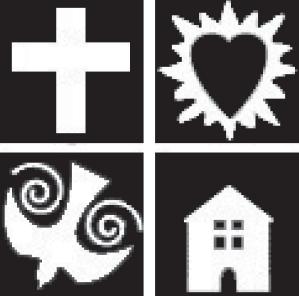
Casa Juan Diego
P.O.Box 70113 | Houston, TX 77270 (713) 869-7376
info@cjd.org | www.cjd.org
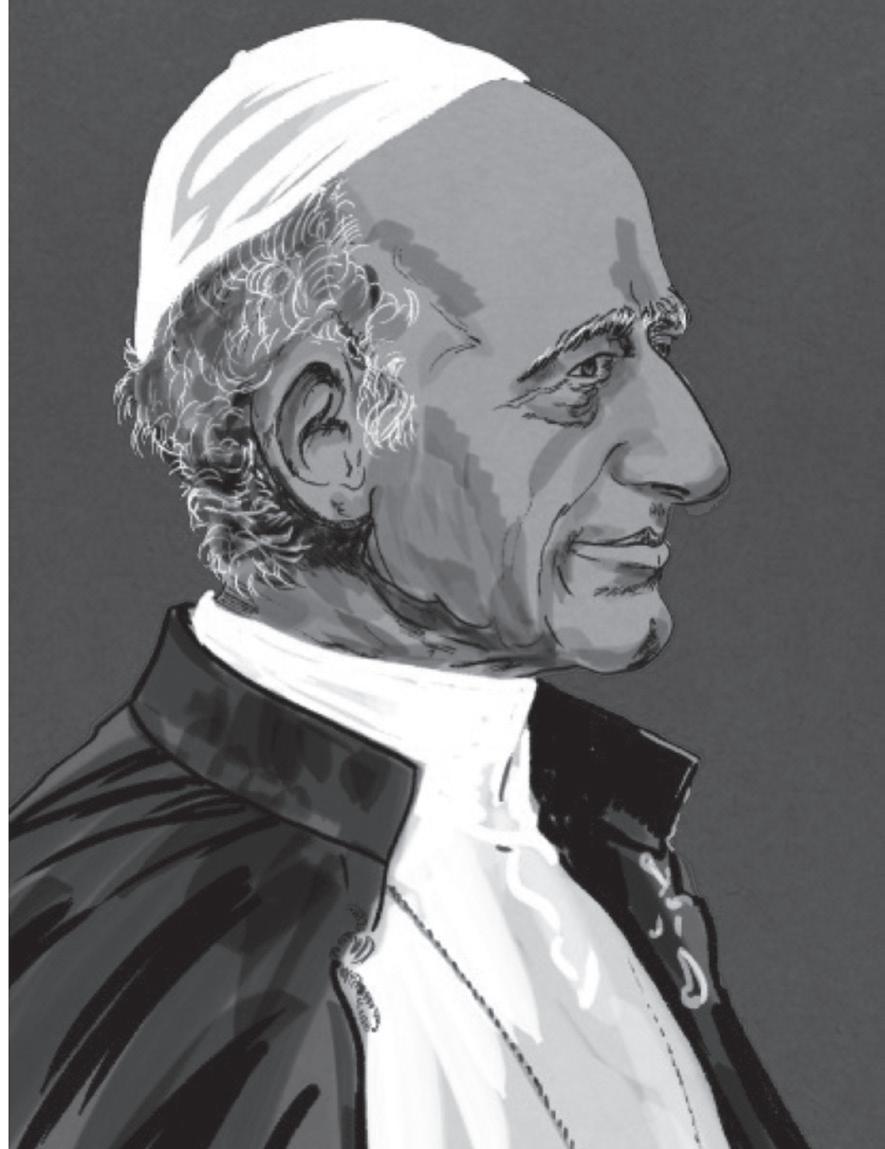
Every baby eventually gets a name that someone else chooses for him or her. Usually, their parents are the selectors of the names as they remember some relative, reflect on a poem, a month or someone whom they admire. In the case of a pope, the selecting of a name for this new life, usually has to do with an inspiration or a memory in the church which comes to them as they work through a conclave or perhaps even before, in a moment of inspiration and at the urging of the Holy Spirit.
Pope Leo fourteenth admitted to having some of this experience. He was thinking of Leo the Thirteenth and Rerum Novarum. And what happened in the past few weeks, as the result of the name choice, is that popular culture in the Latin American world has used his name, Leo and its significance as lion to write some very moving and rhythmic Latin songs which mention Leo, the lion as roaring out justice and compassion and sending Leo the Lion to care for Sheep in the same way Peter was invited to shepherd.
Rerum Novarum means Of New Things and Pope Leo the thirteenth in 1891 was addressing a challenge, a problem, a crisis brought about and in the context of the industrial revolution where people seeking jobs and a living wage had no bartering power and few recourses. He also writes in an era where the threat of socialism/ communism lurked to attract revolution from injustice by violent means.
By Elena Mack, SCL
A basic tenet of this document is that everyone has the right to own land, a promise for the garden restored. The land is also identified with a right to work to provide for his/ her needs and those of their families. This right includes earning a salary and the acquiring of sufficient goods that can be left as an inheritance for children. The state in the case of extreme necessity, should be sought as a source of public aid.
The teaching of the Gospel is the work of the Church which employs the means necessary to consult and seek solutions for the problems of and the interests of the working class. In number 22 of this document the right to own and use riches does not exempt anyone from addressing the needs of others thus: and to share them without hesitation when others are in need. The State must recognize the rights of all as equal and to work towards roads of distributive justice.
Pope Leo thirteenth also showed the right to strike in order to achieve better working conditions as necessary, and of awareness of conditions which were so dire that immigration was the only avenue for some to achieve a stable, safe and fulfilled life for their families.
Pope Leo the fourteenth mentioned Leo thirteenth and Rerum Novarum…of New Things as a reason for his selection of the name and indicated by this choice, a desire to work for the social justice so needed in the world of today. Notwithstanding he desires to continue the work legacy of his immediate predecessor, Pope Francis.
Catholic Worker and Rerum Novarum
Catholic Worker has as one of its foundational pillars the concept of personalism, a mirror to the historical insights of Rerum Novarum which emphasizes the importance of each person in the world and in a very concrete way the work place. It stresses that the laborer is not the coin of the realm but an individual with rights and dignity which cannot be exchanged for low wages accepted out of necessity to feed and clothe a family. And that this person has a right to a wage that guarantees him or her the possibility of time for rest, for family and for opting for better situations and working conditions. Personalism goes beyond the work place and means that everyone who comes to the door of a Catholic Worker house, with a need, is met, greeted and seen as a guest not a client and therefore merits the Workers attention and concern for thus we await the person of Christ at the door.
Sister Elena, of the Sisters of Charity at Leavenworth, has come several times during the past few years to spend a number of weeks living and working with us at Casa Juan Diego. Before that time, she had spent many years working in Peru.
Artist: Angel Valdez
By John Butler, M.D.

“I exhort all the faithful of the Catholic Church, and all men and women of good will,not to give in to narratives that discriminate against and cause unnecessary suffering to our migrant and refugee brothers and sisters.” — Pope Francis, letter to American Bishops, February 10, 2025.
For the past ten years, Thursday mornings have found me at Casa Juan Diego clinic in Houston, caring for patients whose stories are as varied as they are profound. Today feels different. The Church has just elected a new leader—Pope Leo. We were blessed to have Pope Francis, a man deeply moved by the work of Dorothy Day and the Catholic Workers. His letter to the American Bishops, urging compassion for migrants, was among his last messages before illness took him.
Pope Leo is a new chapter—born and raised in the U.S., yet having spent much of his adult life in Peru. Like so many of our patients, he is an emigrant. With hope in our hearts, we look toward a Church building bridges, fostering understanding between peoples and nations.
In recent months, the atmosphere at Casa Juan Diego has shifted. Turning onto Rose Street, the parking lot is nearly full, yet I see only one family quietly waiting for food distribution. Usually, the yard buzzes with families chatting, laughter spilling out into the morning air. Inside, the waiting room is full but unusually hushed—just a few patients speaking softly. Before, it was a noisy space where voices competed for attention.
Clinic visits remain a mosaic of humanity—routine follow-ups, medication refills, new patients with acute illnesses, and those seeking help paying for costly prescriptions, diagnostic tests, and medical devices. Today, a man arrived with malignant melanoma. He had already paid nearly $500 out-of-pocket for the initial evaluation and biopsy. Now he faced an $800 bill for the procedure to remove the tumor. After reviewing the charges, we asked Louise if Casa Juan Diego could help. As almost always, the clinic stepped in, covering the cost with a check to the dermatology office.
Over the years, the faces and stories of our patients have left indelible marks on my heart—tales of immense suffering and unimaginable courage. Stories of trekking through jungles in Panama, braving danger and exhaustion, all for the hope of a safer life in America. One story I carry with me is that of Chris (a name changed to protect privacy).
Chris first came to Casa Juan Diego in the winter of 2021, when clinics were reopening after Covid lockdowns. He was 28, from Honduras, sick for many months but afraid to seek help. His weight was failing,
and his vision in one eye was rapidly deteriorating. Why he avoided local county hospitals remains unclear, but I suspect the fear of being undocumented and unable to speak English kept him away. A family friend finally told him about Casa Juan Diego.
We diagnosed Chris with advanced HIV. Over the past four years, I’ve seen him countless times at both Casa Juan Diego and Legacy Health, where I also work as an HIV doctor. Every visit, Chris is smiling. It’s hard to reconcile that joyous face with the frail man who first walked through our doors. He has regained much of his health, including partial sight in his right eye—a testament to resilience and care.
Like Chris, nearly every patient carries the heavy burden of anxiety—fear rooted in being undocumented, isolated by language, vulnerable to prejudice. That anxiety has grown lately, shadowing every aspect of their lives and health.
Leaving Casa Juan Diego often brings me back to my medical school dreams of missionary work in faraway lands. Yet here I am, caring for people from all over the world—just miles from my own home.
Cost remains a relentless challenge. We purchase medications for patients. Many patients, however, struggle with diabetes and obesity, conditions that can be transformed by newer medications—medications often priced far beyond their reach. Prescription assistance programs rarely extend to non-citizens, and this dilemma weighs heavily on every physician in the clinic. We are determined to find ways to bring the latest treatments to those who need them most.
In reflecting on Dorothy Day’s spiritual legacy, I see the power of simplicity—the radical act of seeing Christ in every person we meet, literally taking Jesus’s words to heart. Every Thursday morning at Casa Juan Diego is a communion with the body of Christ—each patient a sacred encounter.
I have never left this clinic without feeling more enriched, more hopeful. I am deeply grateful for Louise Zwick (and Mark), whose unwavering commitment for 45 years has made Casa Juan Diego a sanctuary for emigrants in Houston. Through her and all the staff, this place is a beacon of compassion and dignity.
Our new Pope Leo XIV belongs to the Augustinian Order
By Dorothy Day
Thurs., 8/28 – Feast of St. Augustine, (A.D. 354-430).
My favorite quotation from The Confessions of St. Augustine: “What is it that I love when I love my God? It is a certain light that I love and melody and fragrance and embrace that I love when I love my God — a light, melody, fragrance, food, embrace of the God — within, where, for my soul, that shines which space does not contain; that sounds which time does not sweep away; that is fragrant which the breeze does not dispel; and that tastes sweet which, fed upon, is not diminished; and that clings close which no satiety disparts — this is what I love when I love my God.”
St. Augustine is a favorite saint of Frank Sheed, who translated the entire Confessions during a trans-Atlantic crossing by steamship. Frank and his wife, Maisie Ward, were among the earliest friends of the Catholic Worker.
— From The Catholic Worker September 1, 1980
Now, I Ask You, Do You Think That These Things Happen Only to St Augustine?

“St. Augustine begins his Soliloquies thus: ’I was a prey to a thousand various thoughts and for many days had been making strenuous efforts to find myself, myself and my own good, and to know the evil to avoid, when on a sudden–was it myself? Was it some other? Was it without or within me? I cannot tell, yet above all things ardently longed to know:–at all events, suddenly it was said to me:”If you find what you are seeking, what will you do with it? To whom will you confide it?“–”I shall keep it in my memory,” answered I.
“But is your memory capable of treasuring up all that your mind has conceived?”–“No, certainly it cannot.” “Then you must write.”–But how can this be done, seeing that you believe your health unequal to the labor of writing? These things cannot be dictated; they demand the most complete solitude. “That is true; I know not, then, what to do.” “Listen! Ask strength, ask help to find what you seek. Then write it, that this offspring of your mind may animate and strengthen you. . . .”’
“Now, I ask you, do you think that these things happen only to St. Augustine?”
— From Pere Gratry’s THE WELL-SPRINGS
But I am a woman, with all the cares and responsibilities of a woman, and though I take these words of Pere Gratry and of St. Augustine to heart, I know that what I write will be tinged with all the daily doings, with myself, my child, my work, my study, as well as with God. God enters into them all. He is inseparable from them. I think of Him as I wake and as I think of Teresa’s daily doings. Perhaps it is that I have a wandering mind. But I do not care. It is a woman’s mind, and if my daily written meditations are of the people about me, of what is going on,–then it must be so. It is a part of every meditation to apply the virtue, the mystery, to the daily life we lead.
I shall meditate as I have been accustomed, in the little Italian Church on Twelfth Street, by the side of the open window, looking out at the plants growing on the roof, the sweet corn, the boxes of herbs, the geraniums in bright bloom, and I shall rest happy in the presence of Christ on the altar, and then I shall come home and I shall write as Pere Gratry advises, and try to catch some of these things that happen to bring me nearer to God, to catch them and put them down on paper.
It is something I have wanted to do, which I have done sketchily for some years. Usually I have kept a notebook only when I am sad and need to work myself out of my sadness. Now I shall do it as a duty performed joyfully for God.
— From Dorothy Day’s book, House of Hospitality. Our Sunday Visitor publishing, 75th anniversary edition.
By Maria
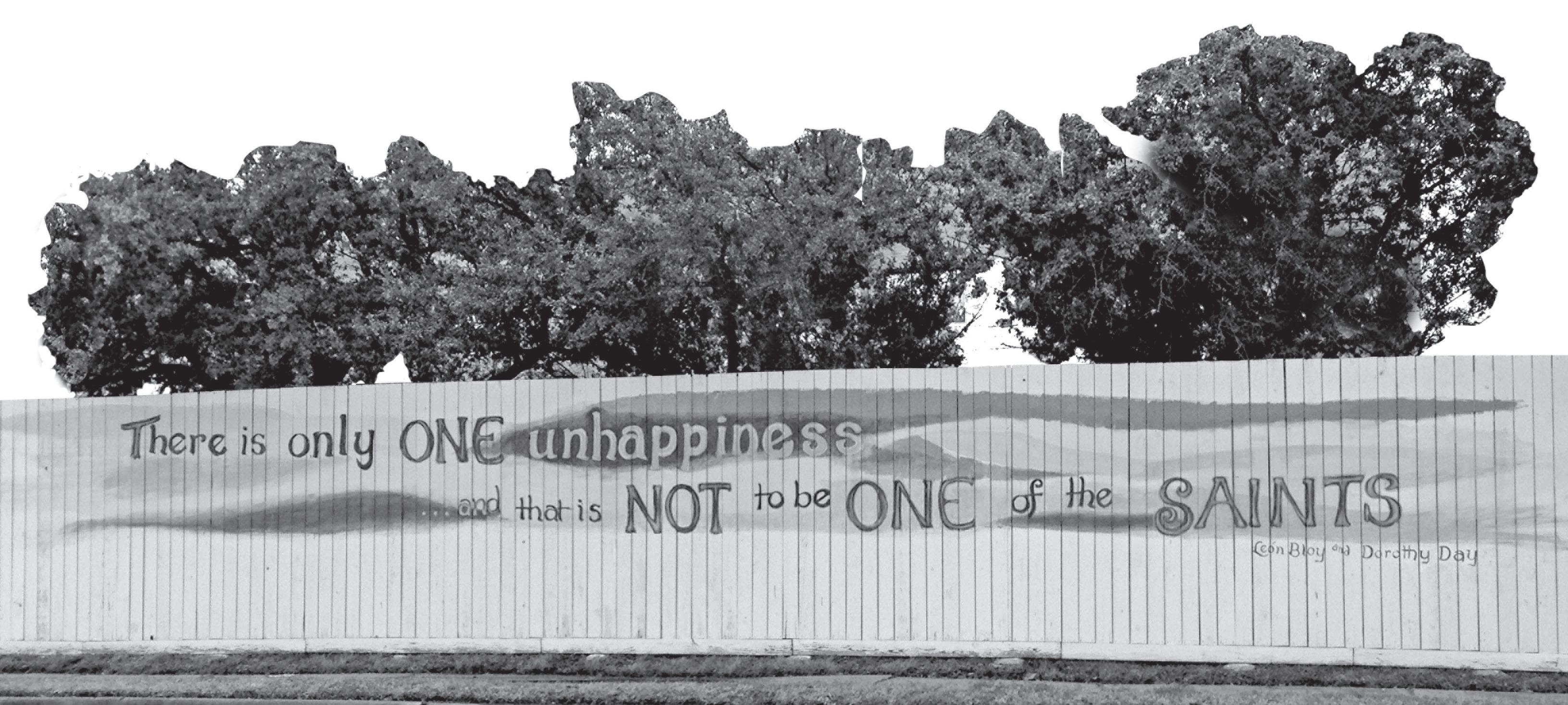
This is my story about reaching the United States, about everything I had to go through to get here.
I left Venezuela seeking a better future, in order to be able to help my mother and children, since the situation in Venezuela is critical. I began my migration when I arrived in Colombia, passing through a town called Acandí. I stayed in a hidden house and waited for a boat to take us to a mountain called La Llorona.
From there, we began the journey and faced a sad reality: hunger and dehydration. When we reached the top of the mountain, there was a section they called Las Banderas. From there, going down it was very steep; children, adults, and the elderly fell off the cliff because it was so steep. It was something I experienced. It’s shocking why the people of Venezuela had to suffer so much.
When the guides took us to Darién and left us in that jungle with that river, that’s where the journey and the fear began. I tried to get there quickly and cross the river; only our Lord Jesus Christ accompanied me. They left me alone because the people walked quickly, and I didn’t. They left me behind, and I had to camp alone under a tree whose branches fell to the ground. There I made my refuge. The only one who gave me strength was Jesus Christ of Nazareth. My love for God was so great that I didn’t feel fear or hunger.
In that jungle, though, I lost my passport When dawn broke, I heard the roar of the gorillas. From there, walking and crossing the river, drinking water from the waterfalls, more people passed me and helped me cross. I was on my second day. I met some people who gave me food, dry clothes, and lots of sweet brown sugar to revive me. Night fell, and they gave me shelter in that tent. Dawn broke again for the third day. The people left me alone because they walked quickly, and I didn’t.
Further on, in that forested jungle, I heard a noise and hid in some undergrowth. They didn’t see me. They were two men armed with very sharp machetes. Suddenly, some migrants came. There were 10 people, including a 16-year-old girl. These men attacked the crowd and took the girl away to rape her. Two men beat her, and I was hiding. They didn’t see me. I saw them, and I saw the girl as they raped her and beat her. I left, and they didn’t see me.
I started walking. I tripped over a solid rock, very slippery and dangerous. Later, some Venezuelans arrived and helped me, but they also stole all my clothes and forty-five dollars, which was the only thing I had with me. After that, I hid because they wanted more money. They rescued a girl who had a broken foot and couldn’t walk. They were the same two who robbed me.
Passing the large rocks, I climbed onto another rock, and a Haitian man helped me. After those falls and stumbles, we finally
arrived at some boats waiting for the migrants. I went with them to another town in Panama called Pueblo Chiquito. The UN provided us with medical attention and food. I slept on the floor without a sheet or blanket because those bad guys had stolen everything from me.
Then I boarded another boat that took me to a bus stop, with blisters on my feet and no toenails. We finally left Panama and crossed through nearby countries like Costa Rica, Honduras, El Salvador, Guatemala, and Mexico.
When they called me saying I could enter the United States for a CBP1 appointment on August 22, I didn’t find what everyone was talking about: the American dream, but rather an American nightmare. What I went through just trying to help my mother and children is very frustrating. I came with that dream, but it wasn’t like that.
With some people I met, I got to Denton, Texas, in a trailer. I spent the night there. The next day, they took 3,000 Mexican pesos from me. I didn’t know they were leaving for another place I didn’t even know. I didn’t know anything about what they were up to, and I was left alone in that trailer. The owner asked about them, and I couldn’t give her any information. She kicked me out on January 4th of this year. I called the police, and they took me to a shelter in Denton.
That same day, I met a Cuban woman, a young man from Venezuela, and a man who
Thank you for your work and for the Catholic Worker in English and Spanish. Eric Avery, San Ygnacio, Texas
Dear Louise,
I was very grateful to read your essay “Thy will be done on Earth….” Our Jewish ethic teaches from very early on, that the holy life depends on how we live during our life here on Earth, the service we must do for those around us. Afterlife is not a Jewish concept. Your emphasis on the importance of acts during this life is, I believe, the right emphasis. I see you have anchored it in early Christian thought, which makes sense, seeing as Christianity was, early on, a Jewish sect. Of course, huge numbers of Christians live lives of service to those around them in this life, you and your group being an inspiring exemplar. But I can never forget the leader of the Northern Baptist Conference saying that Hitler had he confessed on his deathbed would be admitted to heaven whereas no Jew, no matter how exemplary his life, could ever be! This does not inspire confidence in the Christian ethic! In any event, I greatly admire what you do. Please let me know if, in these deeply troubling times I can be of service.
Sincerely,
Nora Klein, M.D., Houston
Dear CW,
Thank you for your generous witness to God’s immeasurable love for us. And thank you for a great, must-read newspaper! Virgil Tworek-Hofstetter, Springfield, Ohio
came and told us they were offering help in another city. He left us in a shelter, a bit disappointed. Then it was even worse: we stood in line for a place to sleep, and sometimes there wasn’t a bed.
During that back and forth, a woman who is in a wheelchair, abandoned by her daughter, touched me. I took her to eat, to bathe. I took her to go to eat at a church, and I brought her to the shelter.
One morning I took her to her brother so he could take her to the doctor. I talked to him about getting her off the streets because she suffers from high blood sugar, or diabetes. Because of a car accident, she was wheelchair-bound. I talked to her brother because I was already leaving for Mexico City and didn’t want her to be left alone on the streets.
Afterward, I went to ask for help. A company helped me with the tickets. I left because of so much bad luck and injustice. I couldn’t find a job because I was too slow, and my knees were bad. I felt happy because I was going to meet my Mexican sister.
But when I got on the bus, with the tickets they had given me to go to Mexico, I arrived at a place called Laredo, Texas. When I passed over the bridge, through the entire
US and Mexican customs, I had already set foot on Mexican soil. A man from some cartel, got me off the bus and treated me like I was just anyone. I, with my hopes on the ground and sadness, was overwhelmed. My heart... when they returned me to Laredo, I walked sadly down the street of Laredo, alone with my heavenly Father, God.
At that moment, another woman from Honduras was sent back with her two children, and we met at the bus terminal to ask for money or a ride through Piedras Negras. They said they didn’t go through Piedras Negras. A man recommended we spend the night in a shelter in Laredo, Texas. We were able to enter the U.S. again because we had entered through CBP1. We stayed in Laredo until they gave us tickets to Houston, Texas. When we arrived at her friend’s apartment. she told me she was leaving with her daughter. I told her I wasn’t a burden to anyone, and could they do me a favor and take me to a shelter to see if they would accept me.
They left me stranded in a children’s shelter. Since all the workers spoke English, I had to spend the night in a small forest where the train passed. They had abandoned me.
The next day it seemed as if someone waa telling me, “Go, don’t lose faith because I’m taking you to a place where you’ll rest.” Dawn had already broken. I saw a car coming, it stopped where I was sleeping, and a woman got out, It seemed as if she were my God the Father of glory who had brought her. I asked her if she spoke Spanish, and she replied that she did. She fed me, gave me water, took me to a hotel, I took a bath, and I was able to sleep. There I spent the night, and the next day they picked me up and brought me to Casa Juan Diego, where they have given me the encouragement and strength I need. They gave me clothes, shoes, and a lot of love. They are very humble of heart and very loving. They are my family, since my family is in Venezuela. I always carry the workers or collaborators in my heart. So, when I go to Venezuela, God willing, I will tell my grandchildren about them. They took me to the doctor when I got sick, they called me taxis, Uber. They are very attentive to me. I thank God for bringing me here.
This is a part of my story as a migrant. I’m struggling to return to Venezuela, as I don’t have a passport. My mother is very ill, and I want to go back.
In his commentary Luke Timothy Johnson explains the significance of St. Luke’s language about ‘the rich’ and ‘the poor, “The rich stand for those who have their consolation already in society and have no need of God’s consolation. The poor stand for all those who have been rejected on the basis of human standards, but are accepted by God.” (Johnson, 22)
Johnson reminds us that God is at work in these words of Jesus recorded by St. Luke in the Beatitudes, “transforming values, challenging perceptions: the mighty are being cast down, the lowly are being lifted up.” (111) Some have called this the “Great Reversal “ of the values of the world.
The words of St. Luke’s Gospel are not different from Pope Leo’s words in his homily at his first Mass with the Cardinals after the conclave: “Even today, there are many settings in which the Christian faith is considered absurd, meant for the weak and unintelligent. Settings where other securities are preferred, like technology, money, success, power, or pleasure.
At his next homily our new Holy Father emphasized today’s realities which can be enlightened by the Beatitudes pf Luke’s Gospel: “In this our time, we still see too much discord, too many wounds caused by hatred, violence, prejudice, the fear of difference, and an economic paradigm that exploits the Earth’s resources and marginalizes the poorest.
In his homily for the Mass of the beginning of his pontificate on May 9, Pope Leo made an impassioned call for unity in the Church and the world.
“Brothers and sisters, I would like that our first great desire be for a united Church, a sign of unity and communion, which becomes a leaven for a reconciled world.”
“In the words of Saint Augustine: “The Church consists of all those who are in harmony with their brothers and sisters and who love their neighbor” (Sermon. 359,9).
“For our part, we want to be a small leaven of unity, communion and fraternity within the world. We want to say to the world, with humility and joy: Look to Christ! Come closer to him! Welcome his word that enlightens and consoles! Listen to his offer of love and become his one family: in the one Christ, we are one. This is the path to follow together, among ourselves but also with our sister Christian churches, with those who follow other religious paths, with those who are searching for God,
continued from page 1
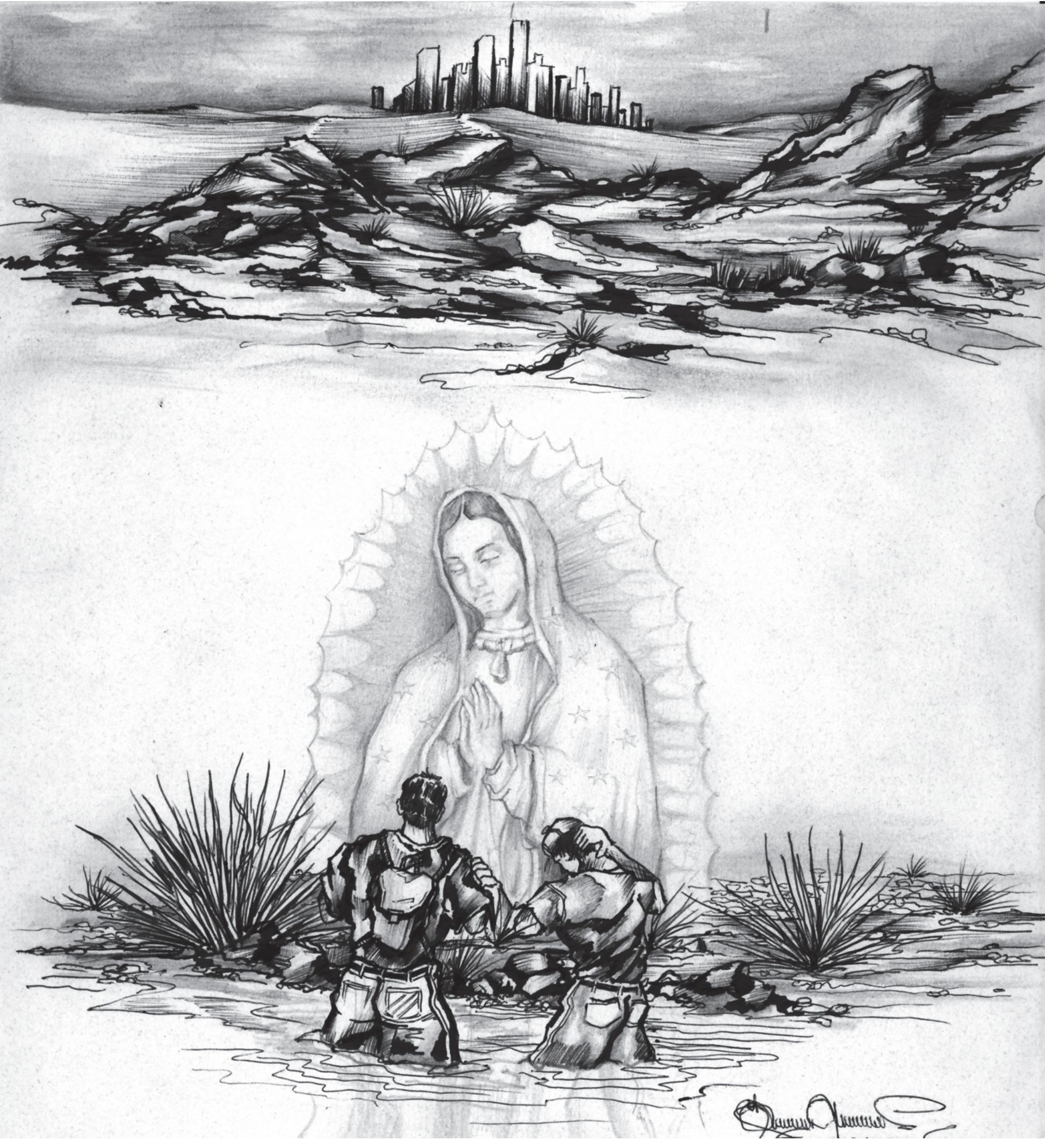
with all women and men of good will, in order to build a new world where peace reigns!”
In his homily for Pentecost this June, Pope Leo referred to Pope Benedict’s Homily for Pentecost in 2005 when he said, “The Church must open the borders between peoples and break down the barriers between class and race. In her, there cannot be those who are neglected or disdained.”
Pope Leo went on to speak of how the Holy Spirit breaks down barriers and opens all kinds of borders — in our relationships with others and between peoples.
He concluded:
“Let us invoke the Spirit of love and peace, that he may open borders, break down walls, dispel hatred and help us to live as children of our one Father who is in heaven.”
References:
Luke Timothy Johnson, The Gospel of Luke. (Sacra Pagina series, Daniel J. Harrington, S.J., Editor.) Liturgical Press, 1991.
Pope Leo XIV. Homily at the Mass for the Beginning of the Pontificate of Pope Leo XIV, May 18, 2025.
Pope Leo XIV. Homily at the Holy Mass Pro Ecclesia celebrated by Pope Leo XIV with the Cardinals, May 9, 2025.
Pope Leo XIV. Homily for Pentecost 2025.
The SBL Study Bible. New Revised Standard Version. Updated edition. 2023
By Kent Keith

GREEN REVOLUTION
by Peter Maurin
Modern society calls the beggar undesirable.
The Catholic Worker calls him our brother.
Modern society calls manual labor drudgery.
The Catholic Worker calls it a joy.
Modern society produces waste.
The Catholic Worker produces food.
For over 22 years, the garden at Casa Juan Diego has flourished. In raised beds and borrowed earth, we’ve grown thousands of pounds of fresh vegetables—food that has gone directly to our house of hospitality, nourishing the poor, the migrant, the sick, the stranger.That garden, tended with love and sweat, has been a quiet but steady act of justice. And now, we invite you to join us.
Until recently, Casa Juan Diego distributed fresh produce to over 1,000 families each month, thanks in large part to the Houston Food Bank’s access to government-supported programs. But in the past year, funding for those programs has been cut. The USDA has eliminated key initiatives like the Local Food Purchase Assistance Cooperative Agreement, and as a result, food banks like Houston’s have lost the ability to purchase truckloads of fresh produce from local farms. The impact is dramatic: fewer fruits and vegetables for the most vulnerable among us.
But we are not without hope—or tools. One of the greatest examples from our country’s past offers us a way forward. During World Wars I and II, millions of Americans planted Victory Gardens—small personal plots in backyards, city parks, and schoolyards. By 1944, over 40% of the vegetables consumed in the U.S. were grown in these gardens. They provided food security, built community, and reminded ordinary people that they had the power to contribute something vital in times of crisis.
Today, we invite our readers and neighbors to take part in a new movement: Peter Maurin Justice Gardens.
Peter Maurin, co-founder of the Catholic Worker Movement, envisioned a world where people lived simply, shared freely, and worked the land not for profit, but for justice. He dreamed of agronomic universities—places where people grew their own food, studied the great works, and practiced hospitality. His words remain as relevant now as ever.
These Peter Maurin Justice Gardens are not only about growing vegetables—they are about growing solidarity. By planting a garden at your home, church, school, or community center—and donating even a portion of your harvest to Casa Juan Diego—you are helping to bridge the gap left by policy and bureaucracy. You are saying, with your hands in the soil, “We will not let our neighbors go hungry.”
At Casa Juan Diego, we are ready to share what we’ve learned over two decades of gardening. We can help you start your own garden. We can connect you with seeds, planting advice, and others in the community who want to grow something beautiful together.
The need is real. The moment is now. And the ground is waiting. Let us till the soil of justice. Let us plant hope. Let us share the harvest.
To become part of the Peter Maurin Justice Garden network or to learn more, please contact: Kent Keith at kkentkeith@yahoo.com
Bring your vegetables (or fruit from your trees) to 4818 Rose St. any morning between 9 and 12, except Sundays